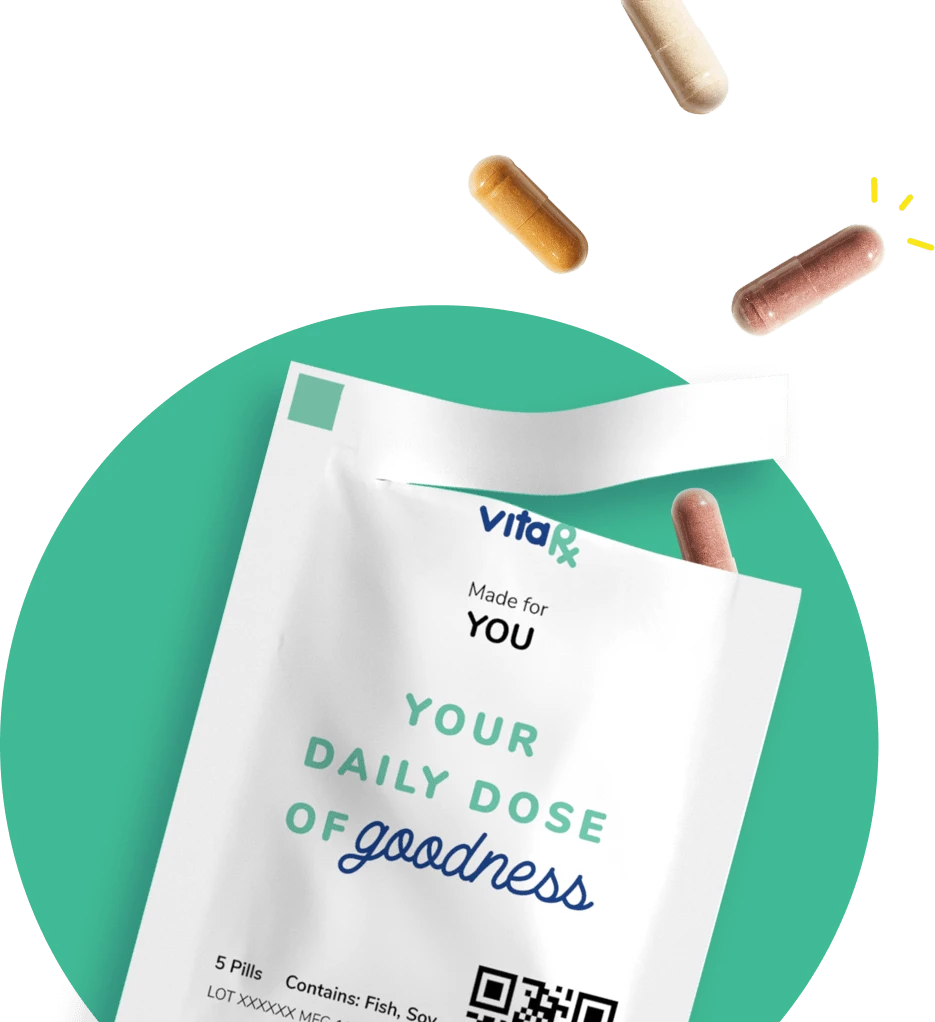Last update: January 17, 2025
Vitamin C: The Complete Guide
Unlock the full power of Vitamin C with our detailed guide. Dive into expert advice on dosages, uncover the wide-ranging health advantages, and familiarize yourself with possible side effects to maximize your wellness journey.

By Derick Rodriguez, Associate Editor
Edited by Dr. Dimitar Marinov, MD, RDN, PhD

Key takeaways
- Vitamin C is a water-soluble nutrient found in fruits and vegetables
- It’s crucial for immune support, collagen formation, and overall health
- Your body can't produce vitamin C, so it needs to come from your diet or supplements
- Watch for signs like slow healing, fatigue, and joint pain for potential vitamin C deficiency
What is vitamin C?
Vitamin C is a water-soluble essential nutrient known for its antioxidant properties. It is found in fruits and vegetables and is crucial in collagen formation, skin health, and immune support. Vitamin C also boosts the absorption of nonheme iron from plant-based sources [1].
Your body needs vitamin C to function. It's indispensable for producing collagen, supporting the immune system, and protecting cells from damage. Additionally, vitamin C boosts the absorption of iron [1].
Can your body produce vitamin C?
No, your body can't produce vitamin C on its own. You must get vitamin C from dietary sources like fruits and vegetables. Unlike some animals, humans can’t produce vitamin C internally [1].
The sailor's savior
Vitamin C played a pivotal role in maritime history. In the 18th century, British sailors began bringing lemons and limes on lengthy sea journeys to ward off scurvy, a disease stemming from a lack of vitamin C, infamous among seafarers.
How does vitamin C work in your body?
What are some benefits of vitamin C?
Learn about the variety of benefits of vitamin C, from boosting your immune system to promoting heart and skin health.
Boosting immunity
Vitamin C helps keep your immune system strong. It assists in creating white blood cells that fight off infections, preventing illness. It also helps strengthen your skin, helps wounds heal faster, and improves overall wellness [2].
Lowering blood pressure
Vitamin C has been studied and shown to possibly lower both systolic and diastolic blood pressure. It's not a complete solution for high blood pressure, but adding vitamin C to your daily routine might be a good choice for a healthier heart [3].
Reducing heart disease risk
Taking a vitamin C supplement may lower your risk of heart disease. vitamin C works well against things that make heart disease more likely, like high LDL cholesterol and triglyceride levels [4].
Supporting joint health
vitamin C plays a role in maintaining overall joint health. Studies indicate that adequate levels of vitamin C are associated with lower levels of uric acid in the blood, a factor relevant to joint comfort. Incorporating vitamin C into your diet through food sources or supplements may contribute to joint well-being, which can be particularly beneficial for individuals focusing on joint health management [5].
Boosting iron absorption
Iron is important for making red blood cells and carrying oxygen in your body. Vitamin C helps iron do its job better. If you don't eat meat, just having 100 mg of vitamin C with your meals can boost how much iron your body absorbs.
Preserving memory and cognition
As you age, your cognitive abilities can decline. Low vitamin C levels have been linked to an increased risk of memory and thinking disorders. Eating foods rich in vitamin C or taking supplements to prevent vitamin C deficiency might help keep your brain healthy as you grow older [7].
What are some signs of vitamin C deficiency?
Pay attention to signs that can indicate your body may be lacking vitamins.
- Fatigue: Increased fatigue and a persistent lack of energy may indicate a vitamin C deficiency.
- Slow Wound Healing: Vitamin C is crucial for collagen production; its deficiency can slow down the healing process of wounds.
- Dry and Damaged Skin: Insufficient vitamin C can affect skin health, leading to dryness and damage due to reduced collagen production.
- Frequent Infections: A weakened immune system, potentially caused by a lack of vitamin C, can increase susceptibility to infections.
- Swollen Gums: Vitamin C deficiency may lead to gingivitis, resulting in swollen and bleeding gums.
- Scurvy: This is a severe form of vitamin C deficiency characterized by general weakness, anemia, gum disease, and skin hemorrhages.
Never self-diagnose
If you feel you may have a deficiency or are concerned or curious about taking this supplement, talk to a doctor or healthcare professional. They can accurately diagnose and recommend the appropriate treatment plan for your specific needs.
Sources of vitamin C
Vitamin C can be obtained from various sources, primarily from foods but also from supplements when dietary intake is insufficient.
Vitamin C-rich foods
Below is a categorization of various foods based on their vitamin C content, helping you to identify sources that can boost your dietary vitamin C intake.
Is food intake always the best?
Obtaining vitamin C from food is generally recommended. However, in cases of significant deficiency, dietary restrictions, or certain health conditions, supplements may be necessary.
Vitamin C supplement formulations
Delivery methods
Vitamin C supplements come in various delivery methods, each offering its own set of benefits and ways of consumption. Here's a brief overview of the different delivery methods:
Choose a method that fits your routine
Do not overlook the delivery method. Vitamin C supplements come in tablets, capsules, soft gel, chewable, powders, and liquid forms—choose the one that best fits your daily routine to stay consistent.
What to look for in vitamin C supplements
When selecting a supplement, several key factors must be considered to ensure you choose a high-quality product that effectively supports your health goals and overall well-being.
Dosage and potency
The dosage of vitamin C in supplements varies, so it's important to choose one that aligns with your specific needs. This includes considering your age, gender, and health status, like pregnancy or existing deficiencies. The vitamin C formulation can impact its potency and bioavailability, which affects how effectively your body can absorb and use it.
Quantity and delivery method
The delivery method is crucial. Vitamin C supplements come in various forms, including tablets, capsules, powders, chewables, and liquid forms. Your choice may depend on factors like ease of swallowing, convenience for traveling, or personal preference regarding taste and texture. Also, evaluate the quantity of vitamin C to determine how long it will last based on your daily requirements.
Quality and manufacturing
Quality is paramount when selecting vitamin C supplements. Look for products manufactured under strict quality control guidelines and those that have undergone third-party testing for purity and label accuracy. Certifications from recognized bodies can be a reliable indicator of a high-quality product. Additionally, consider the manufacturer's reputation and transparency in their production processes.
How and when should you take vitamin C for maximum absorption?
To get the most out of your vitamin C supplement, it's crucial to consider the timing and method of consumption. The following dos and don'ts offer guidance on optimizing absorption, efficiently supporting your health and wellness, and minimizing potential discomfort.
Do’s
Take with a meal to boost absorption.
Consider dividing doses throughout the day for sustained levels.
Swallow the supplement whole with water.
Speak with your doctor before taking any supplements.
Don’ts
Take this with food to avoid stomach issues.
Swallow the supplement without chewing because it might taste bad.
Be careful if you're taking other medications simultaneously.
Who should take vitamin C?
Taking vitamin C supplements has its potential benefits, but it may not be for everyone.
Recommended dosage
Vitamin C plays an important role in many physiological processes, and getting the right dosage is essential for maintaining optimal health at different life stages. Here are the recommended dosages for vitamin C across various age groups [1].
Side effects of excessive vitamin C consumption
While vitamin C supplements are generally safe when taken within recommended limits, excessive intake can have adverse effects [8]:
- Diarrhea: Too much vitamin C, often from supplements, can cause diarrhea in some people.
- Nausea: High doses of vitamin C may lead to feelings of sickness or stomach cramps in sensitive people.
- Abdominal Cramps: Some people might experience stomach cramps or discomfort after taking excessive vitamin C.
- Kidney Stones (in predisposed people): Excessive vitamin C intake may contribute to the formation of kidney stones, especially in people prone to this condition.
- Headache: Rarely, high doses of vitamin C might result in headaches.
- Iron Overload (in predisposed people): People with hemochromatosis or iron overload disorders should be cautious, as increased iron absorption may pose risks with excessive vitamin C intake.
Always consult your doctor
If you're experiencing side effects, consult your healthcare provider. They may recommend a different vitamin C formulation or adjust your dosage. Balancing your vitamin C needs with any discomfort is crucial and should not be overlooked.
Health made easy: your go-to resource for essential vitamins and supplements
Frequently asked questions about vitamin C (FAQ)
Our library of expert-authored articles covers just about every question you might have about vitamins, minerals, and supplements — along with some you might not have known you had.
Final thoughts
Vitamin C is important for health, supporting the immune system, heart, iron absorption, and skin. You can get it from fruits, vegetables, or supplements, but be careful about dosage, especially with medications. Consult a healthcare professional for personalized advice.
Sources and references
- Vitamin C - Health Professional Fact Sheet
- Influence of Vitamin C on Lymphocytes: An Overview - PMC
- Effects of vitamin C supplementation on blood pressure: a meta-analysis of randomized controlled trials
- Vitamin C and Heart Health: A Review Based on Findings from Epidemiologic Studies
- Vitamin C Intake and the Risk of Gout in Men – A Prospective Study
- Review on iron and its importance for human health - PMC
- A critical review of Vitamin C for the prevention of age-related cognitive decline and Alzheimer’s disease - PMC
- Vitamin C - LiverTox - NCBI Bookshelf
Editor

Derick Rodriguez
Derick Rodriguez focuses on editing health and wellness-related content. With over half a decade of experience in the digital realm, Derick has developed a unique skill set that bridges the gap between complex health concepts and accessible, user-friendly communication. His approach is deeply rooted in leveraging personal experiences and insights to illuminate the nuances of health and wellness topics, making them more approachable and empowering readers with knowledge and confidence.
Fact checker

Dr. Dimitar Marinov
Dr. Marinov has years of experience in scientific research and preventive and clinical medicine. His publications in peer-reviewed journals are on nutritional status, physical activity, and musculoskeletal disorders among adolescents.
At VitaRx, we're not just passionate about our work — we take immense pride in it. Our dedicated team of writers diligently follows strict editorial standards, ensuring that every piece of content we publish is accurate, current, and highly valuable. We don't just strive for quality; we aim for excellence.
Related posts
While you're at it, here are some other relevant articles you might be interested in.

Get your personalized vitamin recommendations in less than 3 minutes.
Get your personalized vitamin recommendations in less than 3 minutes.











